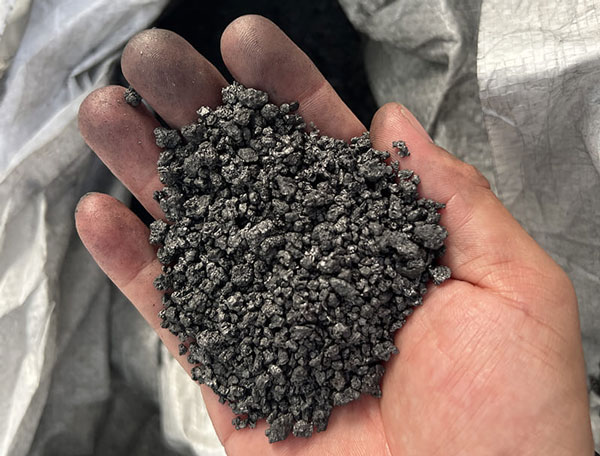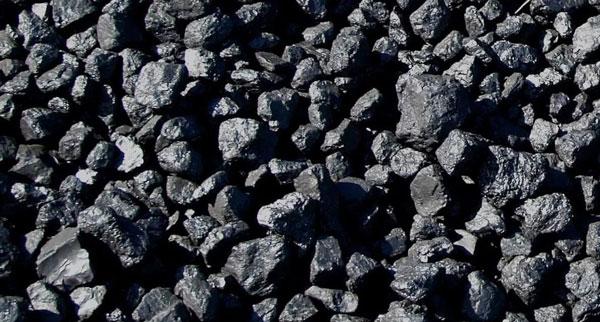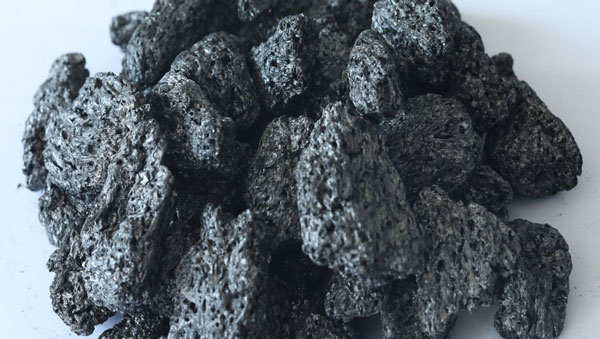What Is Petroleum Coke?
Petroleum coke, often referred to as petcoke, is a carbon-rich solid material derived from oil refining processes. It is produced during the thermal cracking of heavy crude oils in units called coking drums. Known for its high calorific value and low ash content, petroleum coke serves as a valuable byproduct in various energy and industrial sectors.
There are different types of petroleum coke, including fuel-grade and anode-grade, each suited for specific applications. As a trusted supplier in the global energy market, iranpetroexport provides high-quality petroleum coke tailored to meet industrial demands. Its economic value and versatile usage make petroleum coke a critical component in modern industry.
How Is Petroleum Coke Produced?
The production of petroleum coke is an essential part of the oil refining process, particularly in units known as delayed coking units. This process transforms heavy residual oils into lighter hydrocarbons and solid carbon material. Here's a simplified overview of how petroleum coke is produced:
- Heavy crude oil residues are heated in a furnace to extremely high temperatures.
- The heated oil is transferred into large drums where it undergoes thermal cracking.
- During cracking, lighter molecules are vaporized and removed, leaving behind a solid carbon structure.
- The remaining solid material is cooled, removed from the drum, and then broken down into smaller coke pieces.
- Finally, the coke is graded into fuel-grade or anode-grade, depending on its sulfur and metals content.

This precise refining method allows for the large-scale, consistent production of petroleum coke, making it a reliable resource for industries worldwide. Companies like iranpetroexport ensure efficient production and global distribution of this valuable material.
Types of Petroleum Coke
1. Fuel-Grade Coke
Fuel-grade coke is the most commonly produced type and is primarily used as a combustion fuel in power plants and cement kilns. It contains higher levels of sulfur and heavy metals, which make it unsuitable for anode production. Despite its lower purity, this type of petroleum coke is valued for its high calorific content and cost-effectiveness. It is typically ground into smaller particles and burned in industrial boilers. The availability and affordability of petroleum coke in this form make it an ideal option for large-scale energy production.
2. Anode-Grade Coke
Anode-grade coke is a purer form used in the aluminum and steel industries, particularly for the manufacturing of carbon anodes. It has low sulfur and metal content, which is critical for maintaining the quality of the final aluminum product. This type of coke undergoes additional calcination to improve its density and conductivity. The resulting product is essential in electrolytic processes, especially in aluminum smelting. Due to its quality, petroleum coke in anode-grade form is considered a high-value industrial material.
3. Needle Coke
Needle coke is a highly specialized and premium form known for its needle-like crystal structure. It is used mainly in the production of graphite electrodes for electric arc furnaces in the steel industry. This type has extremely low levels of impurities and high structural integrity, making it suitable for precision applications. Its production process is more complex and requires specific feedstocks and conditions. As one of the rarest types of petroleum coke, needle coke commands a significantly higher market price.
4. Shot Coke
Shot coke appears in the form of small, marble-like spheres and is often formed under specific operating conditions in coking units. It is considered a lower-grade form due to its poor structural characteristics and high levels of contaminants. While not preferred in many industrial uses, it can still be utilized as fuel in certain high-capacity boilers. Handling and storage of shot coke can be challenging due to its friable nature. This variation of petroleum coke is typically not used in precision manufacturing sectors.

Petroleum Coke Uses
Due to its high carbon content and efficient combustion characteristics, petroleum coke plays a vital role in many industrial applications. Its economic value and performance under extreme conditions make it a preferred choice across heavy industries. Below are the eight most significant uses of this versatile material, including Paving Bitumen, which is widely used in road construction and maintenance due to its durability and binding properties.
Main Uses of Petroleum Coke:
- Fuel for Cement Kilns
- Power Generation in Thermal Plants
- Anode Production for Aluminum Smelting
- Carbon Additive in Steel Manufacturing
- Gasification Feedstock for Syngas Production
- Manufacturing of Graphite Electrodes
- Feedstock for Chemical Industries
- Export Commodity in Global Energy Trade
1. Fuel for Cement Kilns
Cement kilns commonly use petroleum coke as an efficient fuel alternative to coal. Its high energy density supports stable combustion and reduces operational costs. Because of its lower ash content, it contributes to cleaner burn and easier kiln maintenance. It is particularly useful in regions with limited coal access.
2. Power Generation in Thermal Plants
In thermal power plants, petroleum coke provides a consistent and powerful heat source for electricity production. It is especially valuable for base-load stations that require continuous fuel input. Its energy output per unit mass is higher than many alternatives, making it both efficient and cost-effective. With proper emission controls, it is a viable fuel option.
3. Anode Production for Aluminum Smelting
High-quality petroleum coke is calcined and used in anode blocks for aluminum production. Its purity and low metal content make it ideal for electrolysis processes. These carbon anodes are essential in Hall-Héroult cells used in aluminum refining. This use represents a significant share of the global petcoke market.
4. Carbon Additive in Steel Manufacturing
Steelmakers add petroleum coke to molten metal as a controlled carbon source. This improves strength, structure, and performance of the final steel product. Its consistent quality allows manufacturers to maintain precise carbon ratios. This is a key step in electric arc furnace and ladle metallurgy operations.
5. Gasification Feedstock for Syngas Production
Petroleum coke can be converted into synthesis gas through a gasification process. The resulting syngas is a precursor for ammonia, methanol, and synthetic fuels. This application supports cleaner energy technologies and industrial chemical synthesis. Its carbon richness makes it an ideal feedstock for gasification.
6. Manufacturing of Graphite Electrodes
Certain types of petroleum coke, like needle coke, are essential in the production of graphite electrodes. These electrodes are used in electric arc furnaces for melting scrap steel. Their conductivity and thermal resistance are critical to high-temperature operations. The demand for needle coke is steadily growing in the steel recycling industry.

7. Feedstock for Chemical Industries
In the chemical sector, petroleum coke is processed into raw materials for various carbon-based products. It is used in the manufacture of carbon black, carbides, and activated carbon. These compounds are essential in tires, batteries, and filtration systems. Its availability and carbon concentration make it a cost-effective input.
8. Export Commodity in Global Energy Trade
Petroleum coke is a valuable export product, especially for countries with large refining capacity. It is shipped worldwide to serve as a fuel and industrial raw material. The global market values it for both price stability and energy output. Iranpetroexport supplies petroleum coke to international clients seeking quality and volume reliability.
Environmental Considerations of Petroleum Coke
The environmental impact of petroleum coke largely depends on its composition, handling, and end-use application. While it provides economic and energy advantages, there are growing concerns regarding emissions, storage, and long-term sustainability. A balanced view of its benefits and drawbacks helps industries make informed choices. Additionally, Bitumen Petroleum plays a crucial role in the energy sector, but its extraction and use also raise important environmental considerations.
Environmental Benefits of Petroleum Coke:
- High energy output reduces the volume of fuel required
- Low ash content compared to traditional coal
- Utilizes oil refining byproducts, reducing waste
- Supports industrial efficiency through stable combustion
- Can be gasified into cleaner fuels like syngas
Environmental Concerns of Petroleum Coke:
- Emits sulfur oxides (SOx) and fine particulates when burned
- Dust pollution from open storage or transportation
- Potential heavy metal contamination
- Greenhouse gas emissions contributing to climate change
- Not suitable for residential or small-scale use without strict controls
Although petroleum coke remains a critical fuel and industrial input, its environmental footprint demands careful management. With proper emission control technologies and responsible logistics, its negative impacts can be minimized. As industries move toward cleaner energy sources, petcoke will likely play a transitional role under tighter environmental regulations.
Why Choose iranpetroexport for Petroleum Coke Supply?
Selecting a reliable supplier for petroleum coke is essential for industries that depend on consistent quality, stable logistics, and competitive pricing. iranpetroexport stands out as a trusted provider in the global market, offering tailored solutions for both fuel-grade and anode-grade petcoke.
With advanced refining partnerships and strict quality control processes, iranpetroexport ensures every shipment meets international standards. The company supports clients in sectors like cement, steel, aluminum, and energy with timely delivery and customizable packaging.
Whether you're sourcing bulk volumes for power plants or specialty grades for industrial applications, iranpetroexport delivers value, expertise, and reliability. Its commitment to customer satisfaction and sustainable practices makes it a top choice for petroleum coke supply worldwide.
Conclusion
In conclusion, petroleum coke remains a vital industrial material thanks to its efficiency, affordability, and broad range of applications. As a trusted global supplier, iranpetroexport not only provides premium-grade petroleum coke, but also delivers high-quality fuel oil, diesel, mazut, urea, and bitumen to meet the diverse needs of international clients. With a strong focus on quality, logistics, and customer satisfaction, iranpetroexport supports industries in achieving reliable and sustainable performance. Choosing the right partner means choosing long-term value—and iranpetroexport delivers exactly that.
